139 start with G start with G

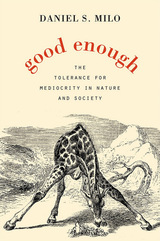
In this spirited and irreverent critique of Darwin’s long hold over our imagination, a distinguished philosopher of science makes the case that, in culture as well as nature, not only the fittest survive: the world is full of the “good enough” that persist too.
Why is the genome of a salamander forty times larger than that of a human? Why does the avocado tree produce a million flowers and only a hundred fruits? Why, in short, is there so much waste in nature? In this lively and wide-ranging meditation on the curious accidents and unexpected detours on the path of life, Daniel Milo argues that we ask these questions because we’ve embraced a faulty conception of how evolution—and human society—really works.
Good Enough offers a vigorous critique of the quasi-monopoly that Darwin’s concept of natural selection has on our idea of the natural world. Darwinism excels in accounting for the evolution of traits, but it does not explain their excess in size and number. Many traits far exceed the optimal configuration to do the job, and yet the maintenance of this extra baggage does not prevent species from thriving for millions of years. Milo aims to give the messy side of nature its due—to stand up for the wasteful and inefficient organisms that nevertheless survive and multiply.
But he does not stop at the border between evolutionary theory and its social consequences. He argues provocatively that the theory of evolution through natural selection has acquired the trappings of an ethical system. Optimization, competitiveness, and innovation have become the watchwords of Western societies, yet their role in human lives—as in the rest of nature—is dangerously overrated. Imperfection is not just good enough: it may at times be essential to survival.

"A brilliant juxtaposition of life and thought. . . . The sympathy of this pictorial biography is rivaled by few books on Nietzsche."—Charles M. Stang, Boston Book Review
"[A] distinguished addition to the Nietzsche-friendly corpus."—Alain de Botton, Los Angeles Times Book Review
"An odd and oddly endearing record of Nietzsche's travels."—John Banville, New York Review of Books

Few would disagree that Western democracies are experiencing a crisis of representation. In the United States, gerrymandering and concentrated political geographies have placed the Congress and state legislatures in a stranglehold that is often at odds with public opinion. Campaign financing ensures that only the affluent have voice in legislation. Europeans, meanwhile, increasingly see the European Union as an anti-democratic body whose “diktats” have no basis in popular rule. The response, however, has not been an effective pursuit of better representation. In Good Government, Pierre Rosanvallon examines the long history of the alternative to which the public has gravitated: the empowered executive.
Rosanvallon argues that, faced with everyday ineptitude in governance, people become attracted to strong leaders and bold executive action. If these fail, they too often want even stronger personal leadership. Whereas nineteenth-century liberals and reformers longed for parliamentary sovereignty, nowadays few contest the “imperial presidency.” Rosanvallon traces this history from the Weimar Republic to Charles De Gaulle’s “exceptional” presidency to the Bush-Cheney concentration of executive power.
Europeans rebelling against the technocratic EU and Americans fed up with the “administrative state” have turned to charismatic figures, from Donald Trump to Viktor Orbán, who tout personal strength as their greatest asset. This is not just a right-wing phenomenon, though, as liberal contentment with Obama’s drone war demonstrates. Rosanvallon makes clear that contemporary “presidentialism” may reflect the particular concerns of the moment, but its many precursors demonstrate that democracy has always struggled with tension between popular government and concentrated authority.
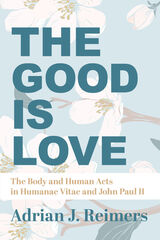
Reimers draws upon the encyclical Humanae Vitae and John Paul II’s catechesis known as the theology of the body to respond to the stalled development of moral theology on the issues most crucial to human love and intimacy. “It is time, we are told, for a ‘paradigm shift’ in the Catholic Church’s moral teaching, such shift representing a more pastoral and less dogmatic approach to moral issues,” writes Reimers. His claim that “a paradigm shift in moral theology and philosophy may be valuable––perhaps vital––to scholars who think and write about these sciences and to teachers who communicate moral truth” is not an exhortation to redefine moral truths. Rather, he argues that an approach to contraception, for example, that relies exclusively on natural law is a hackneyed one and often “tedious.”
John Paul II’s series of catechetical addresses known as the theology of the body was originally composed in the 1970s after Paul VI’s encyclical Humanae Vitae. Albeit derived from the writing of an archbishop and not yet pope, Reimers identifies John Paul II’s perspectives on love, sex and contraception as an essential force behind this so-called paradigm shift in continuity with the profound and unchanging truths set forth in Humanae Vitae. As Reimers states, “Moral truths do not change, even if our ways to understand them improve.”
How, then, is our sense of the goodness or badness of contraception meant to be helped by such a development of thought? Ethics grounded philosophically tends to lean toward legalism in the context of moral actions, says Reimers, as it emphasizes conformity to God’s law and largely overlooks “the relationship between moral behavior and the human person’s ultimate end of beatitude with God.” The important principle of the necessarily two-fold description that natural law gives to sex––namely, as unitive and procreative––must not be the authoritative end of the discussion regarding the moral nature of contraception. In an age where technology has given human beings new power it seems there must be new rules as well, and the conquest of procreative acts changes the human perception of the limitations once associated with harmful acts. Herein lies the importance of John Paul II’s catechesis––the goodness or badness of acts is not just concerned with end of a particular act. As Reimers writes, “If we are to understand the complex relationships among love, marriage, and their sexual expression, we must situate these within the context of the end of the human being.”
A position on contraception and human sexuality cannot be comprehensive without a concept of love properly understood. Human acts must bring us closer to sanctity, not to comfort or possession. Holiness is the perfection of love, and its pursuit aims at ultimate beatitude. This end, the truest love human can know, is the end which ultimately condemns contraception once and for all, as “contracepted sex is contrary to holiness.” Reimers unpacks this sometimes difficult truth in eight chapters, which begin with love and conclude with faithfulness to moral norms and a spirituality of marriage.
The arguments surrounding contraception and “good sex” seem to have set the grounds for coherently choosing a side rather than to have succeeded in presenting certain human acts as definitively immoral. As Reimers notes, a natural law position on contraception often fails to employ its greatest ally: the reality of authentic human love and “victory” of the individual in one’s sanctity as achieved through that love. This work will reorient the objectives and claims of the moral debate, as well as influence the popular notion of what love is and what it cannot be. It is an aid to scholars, students and study groups, humanists, and those who seek to deepen the sense of love’s highest physical expression.
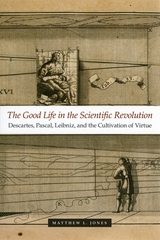
Amid the unrest, dislocation, and uncertainty of seventeenth-century Europe, readers seeking consolation and assurance turned to philosophical and scientific books that offered ways of conquering fears and training the mind—guidance for living a good life.
The Good Life in the Scientific Revolution presents a triptych showing how three key early modern scientists, René Descartes, Blaise Pascal, and Gottfried Leibniz, envisioned their new work as useful for cultivating virtue and for pursuing a good life. Their scientific and philosophical innovations stemmed in part from their understanding of mathematics and science as cognitive and spiritual exercises that could create a truer mental and spiritual nobility. In portraying the rich contexts surrounding Descartes’ geometry, Pascal’s arithmetical triangle, and Leibniz’s calculus, Matthew L. Jones argues that this drive for moral therapeutics guided important developments of early modern philosophy and the Scientific Revolution.

In Good Music, John J. Sheinbaum explores these traditional models for valuing music. By engaging examples such as Handel oratorios, Beethoven and Mahler symphonies, jazz improvisations, Bruce Springsteen, and prog rock, he argues that metaphors of perfection do justice to neither the perceived strengths nor the assumed weaknesses of the music in question. Instead, he proposes an alternative model of appreciation where abstract notions of virtue need not dictate our understanding. Good music can, with pride, be playful rather than serious, diverse rather than unified, engaging to both body and mind, in dialogue with manifold styles and genres, and collaborative to the core. We can widen the scope of what music we value and reconsider the conventional rituals surrounding it, while retaining the joys of making music, listening closely, and caring passionately.
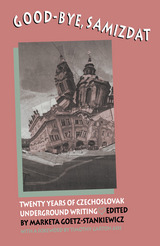
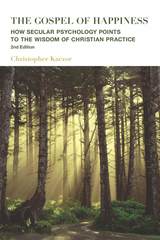
Just as Aristotelian metaphysics provided a new basis for the natural theology of Aquinas’s time, so too, positive psychology provides a basis for a natural moral theology in our own time. this book marshals the empirically verifiable findings of positive psychology that show the wisdom of the Christian tradition. Christian warnings about the dangers of greed, coveting a neighbor’s goods (social comparison), and pride find an empirical verification. Likewise, positive psychology vindicates the wisdom of Christian teaching on the importance of forgiveness, of gratitude, of humility, and of serving one’s neighbor. moreover, positive psychology also can be a service to Christian believers by helping them in their struggles with willpower, by providing new motivations for prayer, and by helping them identify their signature strengths. Finally, this book argues, in a variety of ways, that it is folly to think that even the best of psychology can serve as a replacement for Christianity.

With the rush of calamitous events in recent years—the September 11 terror attacks, the Iraq imbroglio, and hurricanes Katrina and Rita—Americans feel themselves to be living in dark times. Trust in one another and in the government is at low ebb. People in public service face profound challenges to the meaning and efficacy of their work. Where can a public servant turn for a public philosophy to sustain practice?
Inspired by Hannah Arendt and several other philosophers, Governance in Dark Times is the first book to explore the philosophical and value underpinnings needed to guide public servants in these times. Featuring down-to-earth discussions of such issues as terrorism, torture, and homeland security, it suggests ways for people in government to think more deeply, judge more wisely, and act more meaningfully. Camilla Stivers argues that the most urgent requirement in dark times is re-kindling what Arendt called "the light of the public," and offers practical steps for public servants to create spaces for citizen dialogue and engagement in public life. Ideas like "governance of the common ground" and "public service as social hope" will spark discussion and encourage renewed dedication to the work of governing.
Grounded in the author's more than thirty years of teaching and administrative practice, Governance in Dark Times urges public servants in clear, jargon-free prose to reflect, to understand the world we live in, and to act responsibly, both individually and with fellow citizens.
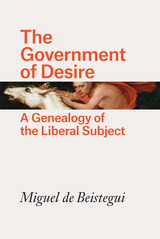
By critically exploring Foucault’s claim that Western civilization is a civilization of desire, de Beistegui crafts a provocative and original genealogy of this shift in thinking. He shows how the relationship between identity, desire, and government has been harnessed and transformed in the modern world, shaping our relations with others and ourselves, and establishing desire as an essential driving force for the constitution of a new and better social order. But is it? The Government of Desire argues that this is precisely what a contemporary politics of resistance must seek to overcome. By questioning the supposed universality of a politics based on recognition and the economic satisfaction of desire, de Beistegui raises the crucial question of how we can manage to be less governed today, and explores contemporary forms of counter-conduct.
Drawing on a host of thinkers from philosophy, political theory, and psychoanalysis, and concluding with a call for a sovereign and anarchic form of desire, The Government of Desire is a groundbreaking account of our freedom and unfreedom, of what makes us both governed and ungovernable.
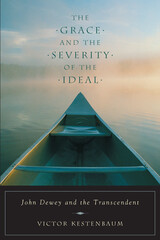
Kestenbaum argues that to Dewey, the pragmatic struggle for ideal meaning occurs at the frontier of the visible and the invisible, the tangible and the intangible. Penetrating analyses of Dewey's early and later writings, as well as comparisons with the works of Hans-Georg Gadamer, Michael Oakeshott, and Wallace Stevens, shed new light on why Dewey regarded the human being's relationship to the ideal as "the most far-reaching question" of philosophy. For Dewey, the pragmatic struggle for the good life required a willingness "to surrender the actual experienced good for a possible ideal good." Dewey's pragmatism helps us to understand the place of the transcendent ideal in a world of action and practice.

How might an oceanic Gramsci speak to Black aquafuturism and other forms of oceanic critique? This succinct work reads Antonio Gramsci’s writings on the sea, focused in his prison notes on waves of imperial power in the inter-war oceans of his time. Sharad Chari argues that the imprisoned militant’s method is oceanic in form, and that this oceanic Marxism can attend to the roil of sociocultural dynamics, to waves of imperial power, as well as to the capacity of Black, Drexciyan, and other forms of oceanic critique to “storm” us on different shores.
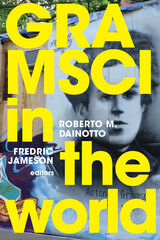
Contributors. Alberto Burgio, Cesare Casarino, Maria Elisa Cevasco, Kate Crehan, Roberto M. Dainotto, Michael Denning, Harry Harootunian, Fredric Jameson, R. A. Judy, Patrizia Manduchi, Andrea Scapolo, Peter D. Thomas, Catherine Walsh, Pu Wang, Cosimo Zene
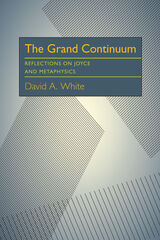
The assumptions that literary criticism and philosophy are closely linked—and that both disciplines can learn much from each other—lead David White to examine key passages in James Joyce’s novels both as a philosopher and as literary critic. In so doing, he develops a thesis that Joyce’s attempt to capture the mysterious process whereby perception and consciousness are translated into language entails a fundamental challenge to everyday notions of reality. Joyce’s stylistic brilliance and virtuosity, his destruction of normal syntax and meaning, “shock one into a new reality.” In the book’s final section, White examines the subtle relation between literary language and human consciousness and traces parallels between Joyce’s stylistic experimentation and Wittgenstein’s and Husserl’s ideas about language.
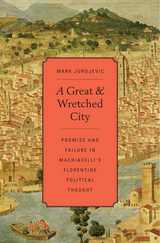
Like many inhabitants of booming metropolises, Machiavelli alternated between love and hate for his native city. He often wrote scathing remarks about Florentine political myopia, corruption, and servitude, but also wrote about Florence with pride, patriotism, and confident hope of better times. Despite the alternating tones of sarcasm and despair he used to describe Florentine affairs, Machiavelli provided a stubbornly persistent sense that his city had all the materials and potential necessary for a wholesale, triumphant, and epochal political renewal. As he memorably put it, Florence was "truly a great and wretched city."
Mark Jurdjevic focuses on the Florentine dimension of Machiavelli's political thought, revealing new aspects of his republican convictions. Through The Prince, Discourses, correspondence, and, most substantially, Florentine Histories, Jurdjevic examines Machiavelli's political career and relationships to the republic and the Medici. He shows that significant and as yet unrecognized aspects of Machiavelli's political thought were distinctly Florentine in inspiration, content, and purpose. From a new perspective and armed with new arguments, A Great and Wretched City reengages the venerable debate about Machiavelli's relationship to Renaissance republicanism. Dispelling the myth that Florentine politics offered Machiavelli only negative lessons, Jurdjevic argues that his contempt for the city's shortcomings was a direct function of his considerable estimation of its unrealized political potential.
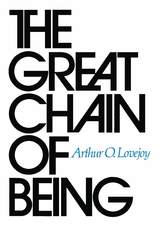
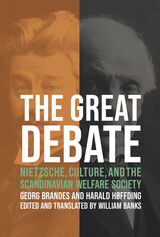
Marking the moment at which the uniquely Nordic concept of social democratic welfare was first contested in the public sphere, this debate provides insights into not only Nietzschean philosophy and its immediate reception but also the foundational concept of modern Scandinavian social, cultural, and political organization. This volume presents, for the first time in any language other than Danish, the debate in its entirety: three essays by Brandes and three by Høffding. A critical introduction by editor and translator William Banks explores the exchange in its context and convincingly argues that the principles contested by the two Danish luminaries still very much resonate in Western society today.

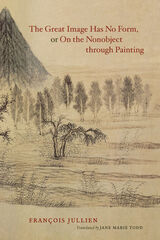
In premodern China, elite painters used imagery not to mirror the world around them, but to evoke unfathomable experience. Considering their art alongside the philosophical traditions that inform it, The Great Image Has No Form explores the “nonobject”—a notion exemplified by paintings that do not seek to represent observable surroundings.
François Jullien argues that this nonobjectifying approach stems from the painters’ deeply held belief in a continuum of existence, in which art is not distinct from reality. Contrasting this perspective with the Western notion of art as separate from the world it represents, Jullien investigates the theoretical conditions that allow us to apprehend, isolate, and abstract objects. His comparative method lays bare the assumptions of Chinese and European thought, revitalizing the questions of what painting is, where it comes from, and what it does. Provocative and intellectually vigorous, this sweeping inquiry introduces new ways of thinking about the relationship of art to the ideas in which it is rooted.
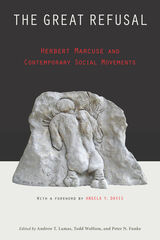
Herbert Marcuse examined the subjective and material conditions of radical social change and developed the "Great Refusal," a radical concept of "the protest against that which is." The editors and contributors to the exciting new volume The Great Refusal provide an analysis of contemporary social movements around the world with particular reference to Marcuse's revolutionary concept. The book also engages-and puts Marcuse in critical dialogue with-major theorists including Slavoj Žižek and Michel Foucault, among others.
The chapters in this book analyze different elements and locations of the contemporary wave of struggle, drawing on the work and vision of Marcuse in order to reveal, with a historical perspective, the present moment of resistance. Essays seek to understand recent uprisings-such as the Zapatistas in Mexico, the Arab Spring, and the Occupy movement-in the context of Marcuse's powerful conceptual apparatus.
The Great Refusal also charts contemporary social movements against global warming, mass incarceration, police brutality, white supremacy, militarization, technological development, and more, to provide insights that advance our understanding of resistance today.
Contributors include: Kevin B. Anderson, Stanley Aronowitz, Joan Braune, Jenny Chan, Angela Y. Davis, Arnold L. Farr, Andrew Feenberg, Michael Forman, Christian Fuchs, Stefan Gandler, Christian Garland, Toorjo Ghose, Imaculada Kangussu, George Katsiaficas, Douglas Kellner, Sarah Lynn Kleeb, Filip Kovacevic, Lauren Langman, Heather Love, Peter Marcuse, Martin J. Beck Matuštík, Russell Rockwell, AK Thompson, Marcelo Vieta, and the editors.
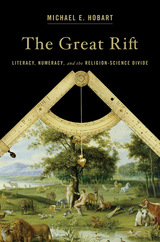
In their search for truth, contemporary religious believers and modern scientific investigators hold many values in common. But in their approaches, they express two fundamentally different conceptions of how to understand and represent the world. Michael E. Hobart looks for the origin of this difference in the work of Renaissance thinkers who invented a revolutionary mathematical system—relational numeracy. By creating meaning through numbers and abstract symbols rather than words, relational numeracy allowed inquisitive minds to vault beyond the constraints of language and explore the natural world with a fresh interpretive vision.
The Great Rift is the first book to examine the religion-science divide through the history of information technology. Hobart follows numeracy as it emerged from the practical counting systems of merchants, the abstract notations of musicians, the linear perspective of artists, and the calendars and clocks of astronomers. As the technology of the alphabet and of mere counting gave way to abstract symbols, the earlier “thing-mathematics” metamorphosed into the relational mathematics of modern scientific investigation. Using these new information symbols, Galileo and his contemporaries mathematized motion and matter, separating the demonstrations of science from the linguistic logic of religious narration.
Hobart locates the great rift between science and religion not in ideological disagreement but in advances in mathematics and symbolic representation that opened new windows onto nature. In so doing, he connects the cognitive breakthroughs of the past with intellectual debates ongoing in the twenty-first century.

In this book, Eric Havelock presents a challenging account of the development of the idea of justice in early Greece, and particularly of the way justice changed as Greek oral tradition gradually gave way to the written word in a literate society.
He begins by examining the educational functions of poets in preliterate Greece, showing how they conserved and transmitted the traditions of society, a thesis adumbrated in his earlier book Preface to Plato. Homer, he demonstrates, has much to say about justice, but since that idea is nowhere in the epics directly stated or expressed, it must be deduced from the speech and actions of the characters. Havelock’s careful reading of the Iliad and the Odyssey is original and revealing; it sheds light both on Homeric notions of justice and on the Archaic Greek society depicted in the poems.
As Havelock continues his inquiry from Hesiod to Aeschylus, his findings become more complex. The oral Greek world shades into a literate one. Words lose some kinds of meanings, gain others, and steadily become more suited to the conceptualization that Plato strove for and achieved. This evolution of language itself, Havelock shows, was one of the principal accomplishments of the Greek world.
Lucidly written and forcefully argued, this book is a major contribution to our knowledge of ancient Greece—its politics, philosophy, and literature, from Homer to Plato.
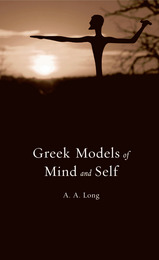
This lively book offers a wide-ranging study of Greek notions of mind and human selfhood from Homer through Plotinus. A. A. Long anchors his discussion in questions of recurrent and universal interest. What happens to us when we die? How is the mind or soul related to the body? Are we responsible for our own happiness? Can we achieve autonomy? Long asks when and how these questions emerged in ancient Greece, and shows that Greek thinkers’ modeling of the mind gave us metaphors that we still live by, such as the rule of reason or enslavement to passion. He also interrogates the less familiar Greek notion of the intellect’s divinity, and asks what that might mean for us.
Because Plato’s dialogues articulate these themes more sharply and influentially than works by any other Greek thinker, Plato receives the most sustained treatment in this account. But at the same time, Long asks whether Plato’s explanation of the mind and human behavior is more convincing for modern readers than that contained in the older Homeric poems. Turning to later ancient philosophy, especially Stoicism, Long concludes with an exploration of Epictetus’s injunction to live life by making correct use of one’s mental impressions.
An authoritative treatment of Greek modes of self-understanding, Greek Models of Mind and Self demonstrates how ancient thinkers grappled with what is closest to us and yet still most mysterious—our own essence as singular human selves—and how the study of Greek thought can enlarge and enrich our experience.
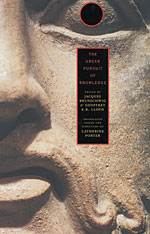
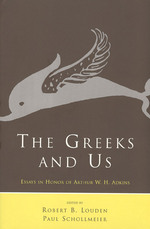
The timely subjects addressed by the contributors include the relation between literature and moral understanding, moral and nonmoral values, and the contemporary meaning of ancient Greek ethics. The volume also includes an essay from the late Adkins himself illustrating his methodology in an analysis of the "Speech of Lysias" in Plato's Phaedrus.
The Greeks and Us will interest all those concerned with how ancient moral values do or do not differ from our own.
Contributors include Arthur W. H. Adkins, Stephanie Nelson, Martha C. Nussbaum, Paul Schollmeier, James Boyd White, Bernard Williams, and Lee Yearley.
Commentaries by Wendy Doniger, Charles M. Gray, David Grene, Robert B. Louden, Richard Posner, and Candace Vogler.
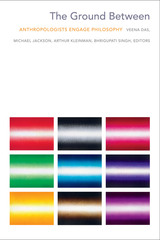
Contributors. João Biehl, Steven C. Caton, Vincent Crapanzano, Veena Das, Didier Fassin, Michael M. J. Fischer, Ghassan Hage, Clara Han, Michael Jackson, Arthur Kleinman, Michael Puett, Bhrigupati Singh
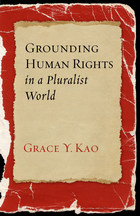
In 1948 the General Assembly of the United Nations adopted the Universal Declaration of Human Rights which declared that every human being, without “distinction of any kind,” possesses a set of morally authoritative rights and fundamental freedoms that ought to be socially guaranteed. Since that time, human rights have arguably become the cross-cultural moral concept and evaluative tool to measure the performance—and even legitimacy—of domestic regimes. Yet questions remain that challenge their universal validity and theoretical bases.
Some theorists are ”maximalist” in their insistence that human rights must be grounded religiously, while an opposing camp attempts to justify these rights in “minimalist” fashion without any necessary recourse to religion, metaphysics, or essentialism. In Grounding Human Rights in a Pluralist World, Grace Kao critically examines the strengths and weaknesses of these contending interpretations while also exploring the political liberalism of John Rawls and the Capability Approach as proposed by economist Amartya Sen and philosopher Martha Nussbaum.
By retrieving insights from a variety of approaches, Kao defends an account of human rights that straddles the minimalist–maximalist divide, one that links human rights to a conception of our common humanity and to the notion that ethical realism gives the most satisfying account of our commitment to the equal moral worth of all human beings.
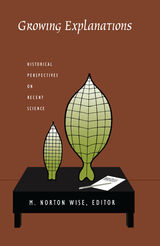
Written by leading historians and philosophers of science, these essays examine the range of subjects, people, and goals involved in changing the character of scientific analysis over the last several decades. They highlight the alternatives that fields as diverse as string theory, fuzzy logic, artificial life, and immunology bring to the forms of explanation that have traditionally defined scientific modernity. A number of the essays deal with the mathematical and physical sciences, addressing concerns with hybridity and the materials of the everyday world. Other essays focus on the life sciences, where questions such as “What is life?” and “What is an organism?” are undergoing radical re-evaluation. Together these essays mark the contours of an ongoing revolution in scientific explanation.
Contributors. David Aubin, Amy Dahan Dalmedico, Richard Doyle, Claus Emmeche, Peter Galison, Stefan Helmreich, Ann Johnson, Evelyn Fox Keller, Ilana Löwy, Claude Rosental, Alfred Tauber

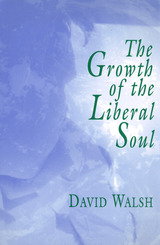
In The Growth of the Liberal Soul, David Walsh confronts a core difficulty of the liberal democratic tradition in explaining and justifying itself. Acknowledging the incompleteness of liberal order as a theoretical explication of its underlying beliefs, Walsh analyzes contemporary debates about the foundations of liberal democratic politics. The widespread abandonment of the search for foundations by John Rawls, Richard Rorty, Michael Oakeshott, and the deconstructionists has been interpreted as signifying the absence of any sustaining inner resources. The result has been the confusion of contemporary liberal democratic self-understanding, which cannot make sense of its own extraordinary historical success nor apparently prevent the evident unraveling of its own moral code. It is this state of crisis from which Walsh's study takes its point of departure.
Unique in combining contemporary political relevance with historical depth, The Growth of the Liberal Soul brings together two approaches that are often treated separately. Walsh elaborates on the existential core of the liberal political tradition by way of an investigation of the historical sources and the raging contemporary debates.
While many scholars have been content to call attention to the dependence of liberal politics on transcendent faith, Walsh studies the progress of experiential reality by which that connection is concretely effected in life. The Growth of the Liberal Soul will be of interest to all readers, especially those interested in the relationship between religion and politics.
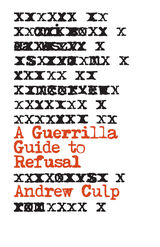
A field guide to a nonfascist life at the end of the world as we know it
A Guerrilla Guide to Refusal is an unexpected approach to philosophy from a guerrilla-logic point of view. Harnessing critical theory to creatively reimagine counterinsurgency, guerrilla warfare, and interventions beyond the political mainstream, it takes us on a journey through anarchist infowar, queer outlaws, and black insurgency—through a subterranean network of communiques, military documents, contemporary art, political slogans, adversarial blogs, and captive media. In doing so, it provides powerful new insight into contemporary political movements that pose no demands, refuse labels, and offer no solutions.
Written to both inspire and provoke, A Guerrilla Guide to Refusal urges us to think through the refusal to participate in politics as usual. Author Andrew Culp demonstrates how evasion can combatively deny the existing order its power. Focusing on punk cinema, anarchist pamphlets, feminist art projects, hacker manifestos, and guerrilla manuals, he foregrounds invisibility as a novel force of disruption. He draws on concepts of criminality, fugitivity, and anonymity to bring a more nuanced understanding of how power makes things—and people—visible.
The book’s unique format is that of a theoretical manual, comprising freestanding segments instead of blueprints. Poised to reach beyond the academy into activist circles, this potent theory-in-action intervention forces us to reconsider the terrain upon which our struggles against patriarchy, anti-Blackness, capitalism, and the state operate.
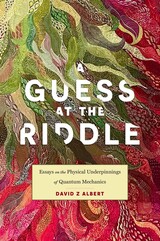
From the celebrated author of Quantum Mechanics and Experience comes an original and exhilarating attempt at making sense of the strange laws of quantum mechanics.
A century ago, a brilliant circle of physicists around Niels Bohr argued that the search for an objective, realistic, and mechanical picture of the inner workings of the atom—the kind of picture that had previously been an ideal of classical physics—was doomed to fail. Today, there is widespread agreement among philosophers and physicists that those arguments were wrong. However, the question of what that picture might look like, and how it might fit into a comprehensive picture of physical reality, remains unsettled.
In A Guess at the Riddle, philosopher David Z Albert argues that the distinctively strange features of quantum mechanics begin to make sense once we conceive of the wave function, vibrating and evolving in high-dimensional space, as the concrete, fundamental physical “stuff” of the universe. Starting with simple mechanical models, Albert methodically constructs the defining features of quantum mechanics from scratch. He shows how the entire history of our familiar, three-dimensional universe can be discerned in the wave function’s intricate pattern of ripples and whorls. A major new work in the foundations of physics, A Guess at the Riddle is poised to transform our understanding of the basic architecture of the universe.
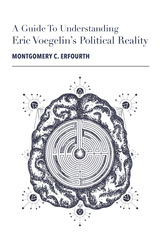
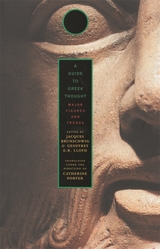

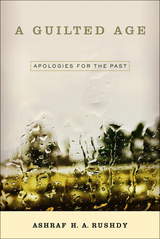
Public apologies have become increasingly common scenes and representative moments in what appears to be a global process of forgiveness. The apology-forgiveness dynamic is familiar to all of us, but what do these rituals of atonement mean when they are applied to political and historical events?
In his timely, topical, and incisive book A Guilted Age, Ashraf Rushdy argues that the proliferation of apologies by politicians, nations, and churches for past events—such as American slavery or the Holocaust—can be understood as a historical phenomenon. In our post–World War II world, Rushdy claims that we live in a “guilted age.”
A Guilted Age identifies the two major forms of apologies—political and historical—and Rushdy defines the dynamics and strategies of each, showing how the evolution of one led to the other. In doing so, he reveals what apology and forgiveness do to the past events they respectively apologize for and forgive—and what happens when they fail.
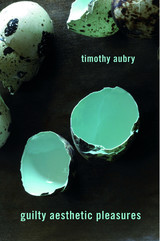
In the wake of radical social movements in the 1960s and 1970s, literary studies’ embrace of politics entailed a widespread rejection of aesthetic considerations. For scholars invested in literature’s role in supporting or challenging dominant ideologies, appreciating literature’s formal beauty seemed frivolous and irresponsible, even complicit with the iniquities of the social order. This suspicion of aesthetics became the default posture within literary scholarship, a means of establishing the rigor of one’s thought and the purity of one’s political commitments. Yet as Timothy Aubry explains, aesthetic pleasure never fully disappeared from the academy. It simply went underground.
From New Criticism to the digital humanities, Aubry recasts aesthetics as the complicated, morally ambiguous, embattled yet resilient protagonist in late twentieth-century and early twenty-first–century literary studies. He argues that academic critics never stopped asserting preferences for certain texts, rhetorical strategies, or intellectual responses. Rather than serving as the enemy of formalism and aesthetics, political criticism enabled scholars to promote heightened experiences of perceptual acuity and complexity while adjudicating which formal strategies are best designed to bolster these experiences. Political criticism, in other words, did not eradicate but served covertly to nurture reading practices aimed at achieving aesthetic satisfaction.
Guilty Aesthetic Pleasures shows that literary studies’ break with midcentury formalism was not as clean as it once appeared. Today, when so many scholars are advocating renewed attention to textual surfaces and aesthetic experiences, Aubry’s work illuminates the surprisingly vast common ground between the formalists and the schools of criticism that succeeded them.

Marshall explores all aspects of Hocquenghem’s writing—journalistic, theoretical, and fictional—much of this work still untranslated. His consideration reaches beyond the aftermath of the events of May 1968 and points toward the ways in which Hocquenghem’s work might invigorate contemporary debates on a range of issues in Marxist and queer theory and in gay, lesbian, and cultural studies. These include the construction of homosexuality in social discourse, the status of "identity politics," and the role of the state and civil society in the determination of each. Demonstrating Hocquenghem’s importance within the framework of French leftist thought, Marshall links him to his contemporaries Foucault, Deleuze, and Guattari. Tracing his connections to the intellectual traditions of Benjamin, Diderot, Fourier, Lucretius, and Gnosticism, he also illustrates Hocquenghem’s place within the European intellectual tradition.Guy Hocquenghem brings an important, challenging, and overly neglected French theorist back to the main stage.
READERS
Browse our collection.
PUBLISHERS
See BiblioVault's publisher services.
STUDENT SERVICES
Files for college accessibility offices.
UChicago Accessibility Resources
home | accessibility | search | about | contact us
BiblioVault ® 2001 - 2024
The University of Chicago Press









